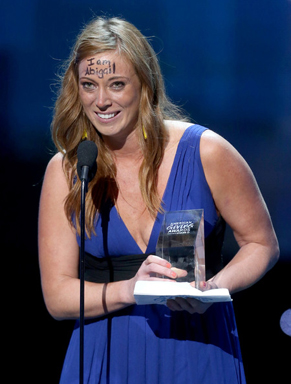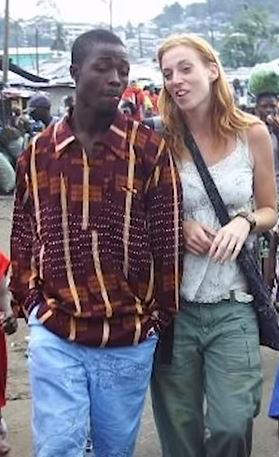 |
Katie Meyler Receiving an Award with her Face Inscribed with the name of Poor and innoscent “Abigail” |
In April 2018, six months before ProPublica and Time Magazine released their documentary “Unprotected” concerning the sexual abuse that occurred at Katie Meyler’s More Than Me school for girls, the More than Me CEO, approached me on a Liberian beach. Meyler knew me by the first name and mentioned that my former boss recommended me to her (which others disputed while discouraging me from getting into bed with her).
It was a sweaty day and Katie did well to run through their issues quickly. A male teacher had abused some school girls but was incarcerated. A hit job was expected and they needed PR control for the organization. She inquired of my Public Relations experience and interest in the job. We exchanged numbers and planned to meet.
The Meyler I met on the beach was much like the one portrayed in the Pro-Publica documentary. She was aggressive yet personable – not afraid to ask for help from complete strangers. She was also a bit off-putting and as I and the rest of the world know now, terribly disingenuous.
After the first meeting, I did some due diligence with friends in higher places and education. Everyone cautioned me to stay away. They advised that I should not get involved. A few weeks later, Katie would again approach me, this time on a roof-top bar. Thankfully, I had accepted a position elsewhere with a manic schedule. So, I politely declined.
I posted on Facebook briefly about this interaction. It was in response to denials by some of Meyler’s supporters that she was not engaged in a cover-up. They remarked that she had done all she could for the girls following the horrific acts committed by MacIntosh, her ex-boyfriend and community liaison officer, the ex-rebel turned educator.
I know of at least two other Liberian journalists Meyler approached before the publication. If Meyler had spent as much time looking after the girls and supporting them following the crimes, as she did scouting for spin doctors, she might be in less of a mess.
Katie is entitled to help, just as much a public relation specialist is needed if not more than a lawyer these days. However, it shows clearly how she views what happened and her wrongdoing. In our impromptu beach meeting, she casually downplayed the seriousness of what had occurred on the More Than Me grounds. Meyler alluded that few girls had been sexually abused. At least 10 girls testified in court. Others such as Liberian political pundit Taa Wongbe put the number at over 40 plus girls. Her expression was as if justice was served for the girls. It never was.
Meyler’s crime in this ordeal is indisputable. Devoid of oversight and regard for the girl’s safety, the inappropriate relationships and activities with her students, is loud. Her abandonment of the girls during the court proceedings when most needed deserves both national and international outcry.
Her claims of not being subpoena by the court and also not understanding Liberia’s legal system, are lazy. The further claim that she and her staff lack the expertise of running a school is no excuse excluding her of guilt.
The sexual abuse revelation at MTM has sparked a protest by Liberians at home and the Diaspora. A mass protest was held last Thursday gripping the attention of the government. It is also rumored that the Liberian Government is considering reopening the case. A task force investigation is underway by several civil society groups.
The More Than Me story has garnered so much interest. Perhaps, because, unlike most other sexual assault cases, there is a woman at the center.
In the world of #MeToo, seemingly every day, there is a new accusation made against a man of power. Every day another man is held to the fire for sexual and violent misconduct. The west’s current “war on men,” as rape apologist refers to it, is subtly drowning out the on-going and deep-rooted sexual abuse still occurring in developing countries.
 |
| More Than Me |
But, ‘More Than Me’ has returned Liberia at the center of a discussion about race, poverty and sexual abuse. The ProPublica documentary and Time article focuses more on Meyler’s culpability than the crimes themselves. It is a sickening case of a white savior complex and what infuriates us all about NGOs and foreign-aid.
The school leadership accepts their mistakes and say that they were naïve. But, “Sorry, we didn’t know better,” doesn’t suffice in 2018. They knew enough to open a school, to have the then president of Liberia donate a building and receive millions of dollars on the school’s behalf.
My and other’s claims of interactions with Meyler clearly illustrate that she knows exactly what she was doing. She understands better than me and many other Liberians I would argue, Liberia, its culture and what you can and can’t get away with.
Meyler like her counterparts understands that Liberia was and still is an insecure child that can’t be trusted at home alone. Her parents be-it NGOs or the likes of the World Bank and UN must watch over her as she bathes making sure she doesn’t drown in the bath water.
She can’t be trusted with a task such as providing clean water, electricity or education for her citizens. She needs big kids like Meyler to show her how to do it. Meyler has shown to Liberia and Africa once again, the big kids will look out for you on the playground, but they expect a piece of your lunch money.
As long as Liberia and the functionality of her institutions are dependent upon outsiders, the country will always be in danger. A pervasive state of insecurity. Liberians and their government are also to blame for what happened at More Than Me.
In no way was I surprised by the story or that Katie brought underage children to expat parties or that the children were sleeping at her boyfriend McIntosh's house. It was neither to the knowledge of his wife about what was ongoing. These improprieties have become a part of the country’s culture.
I mentioned in my Liberia’s #MeToo article that hundreds of girls pay for their education with their bodies. The beach of Meyler and I’s first meeting is notorious for sex-workers. Every weekend, underage girls are seen with or being escorted from bars by elderly men. Our silence perpetuates what has become a norm. Society is guilty.
In a report covering January –September 2018 from Liberia’s Ministry of Gender, over 900 sexual and gender-based violence cases were reported. 500 were rape cases and 475 involved children.
In our little country of 4.6 million people, child abuse and prostitution are rampant. Yet, Liberia has one of the strictest rape laws in the world. President Ellen-Johnson historically made rape a non-billable offense which members of the Liberian Senate have continuously pushed to amend. Years later, rape is still the second most reported serious crime in Liberia and many of the cases never result in a conviction, like the More Than Me case.
Others have argued that the reoccurrence of rape and impunity is more-so a symptom of the post-war trauma and terminal poverty Liberia suffers but rape/sexual assault is a topical issue all around the world.
Especially in this sort of case, where a protector becomes the abuser. The UN alone has revealed, that over the past five years the UN has recognized the claims of 612 women and children who say they were victims of abuse, involving 353 separate claims against UN staff in peacekeeping operations alone, reports Express News.
Some have claimed that the More Than Me scandal would not happen in the West. But, arguably, as we’ve seen in the recent cases of Penn State and USA gymnastics, sexual assault cover-ups occur all around the world.
Like those cases, the More Than Me rape story was concealed by people in positions of power. They were aware of the truth of the matter yet, declined to help. Child sexual abuse will continue to be widespread until all those surrounding these cases – the educators, board members, government officials and the rest trusted to protect are held accountable.
I had no idea of the seriousness of the abuses or that it was ongoing until the recent story came out. I have learned from the post and private discussions, there was widespread knowledge of this: numerous people who were not even involved in education or the justice system but in positions of power were in the know.
Because those who knew preferred to engage in a cover-up or keep silent on the matter, Meyler opened 19 more schools in Liberia overseeing approximately 4,000 students across the country. The West Point Community was not alerted that there were now an additional 10 - 40 impoverished girls more than likely infected with HIV. They may or may not be receiving treatment living in the slums and pose a serious health risk to the community.
The National AIDS Commission of Liberia reported that in 2017, an increase in the number of persons living with HIV in Liberia from about 33,000 persons to 43,200 persons. The effects of their silence are real and dangerous.
We are all inherently to blame --- I included. As a writer and occasional journalist, when I was advised to decline Katie’s PR offer as a client, I should have delved into the story. As critics rightfully point out – this case happened years ago, why did it take a journalist from abroad to bring attention to it?
This case shows that Liberia continues to be the poster child for all that is wrong in Africa: impunity, corruption and widespread abuse. Liberia has also, and I believe still is a poster child for all that is possible in Africa: stable democracy following years of civil unrest, feminist movements and the unwavering tenacity of its people.
Unfortunately, we continue to succumb to impunity in corruption and sexual abuse. It is too weak and reckless to continue to use poverty as an excuse.
What does it say about us a country, as a people to the rest of the world? It is no surprise that we continue to go unprotected.
